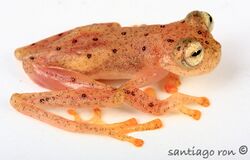Biology:Nymphargus anomalus
| Nymphargus anomalus | |
|---|---|

| |
| Scientific classification | |
| Domain: | Eukaryota |
| Kingdom: | Animalia |
| Phylum: | Chordata |
| Class: | Amphibia |
| Order: | Anura |
| Family: | Centrolenidae |
| Genus: | Nymphargus |
| Species: | N. anomalus
|
| Binomial name | |
| Nymphargus anomalus | |
| Synonyms[3] | |
| |
Nymphargus anomalus is a species of frog in the family Centrolenidae. It is endemic to Ecuador and occurs on the Amazonian slopes of the Ecuadorian Andes in the Napo Province.[3] Common name Napo Cochran frog has been coined for it.[3]
Description
Adult males measure 21–25 mm (0.8–1.0 in) and adult females 26–27 mm (1.0–1.1 in) in snoot–vent length.[4] The snout is short and truncate. The tympanum is visible, with its upper edge barely covered by the weakly-developed supra-tympanic fold. The fingers are only slightly webbed and have broad discs. The toes are two-thirds webbed and have discs that are rounder and slightly smaller than those on the fingers. The coloration is tan, which is unusual among the related species—hence the specific name anomala, from Greek "unusual". There are small, black ocelli that enclose orange-tan spots.[2]
Habitat and conservation
Nymphargus anomalus occurs in vegetation bordering mountain streams at elevations of 1,668–1,771 m (5,472–5,810 ft) above sea level. It is nocturnal. Males call from the vegetation. Females attach their eggs on mossy branches over the stream.[4] The male holotype was found on a mossy limb of a bush, about 1.5 m (5 ft) above a cascading rivulet.[2]
The habitat at the type locality has been subject to some habitat loss.[1] For a long time, this was the only known locality. However, in 2009 one new population was found near the Llanganates National Park, and another from the Sumaco volcano[4] (not specified whether the locality was within the Sumaco Napo-Galeras National Park).
References
- ↑ 1.0 1.1 IUCN SSC Amphibian Specialist Group (2022). "Nymphargus anomalus". IUCN Red List of Threatened Species 2022: e.T54946A98643606. https://www.iucnredlist.org/species/54946/98643606. Retrieved 23 December 2022.
- ↑ 2.0 2.1 2.2 Lynch, J. D.; Duellman, W. E. (1973). "A review of the centrolenid frogs of Ecuador, with descriptions of new species". Occasional Papers of the Museum of Natural History, University of Kansas 16: 1–66. https://www.biodiversitylibrary.org/part/29040.
- ↑ 3.0 3.1 3.2 Frost, Darrel R. (2017). "Nymphargus anomalus (Lynch and Duellman, 1973)". Amphibian Species of the World: an Online Reference. Version 6.0. American Museum of Natural History. http://research.amnh.org/vz/herpetology/amphibia/Amphibia/Anura/Centrolenidae/Centroleninae/Nymphargus/Nymphargus-anomalus.
- ↑ 4.0 4.1 4.2 Guayasamin, J. M. (2014–2017). "Nymphargus anomalus". in Ron, S. R.; Yanez-Muñoz, M. H.; Merino-Viteri, A. et al.. AmphibiaWebEcuador. Version 2018.0. Museo de Zoología, Pontificia Universidad Católica del Ecuador (QCAZ). https://bioweb.bio/faunaweb/amphibiaweb/FichaEspecie/Nymphargus%20anomalus.
Wikidata ☰ Q604124 entry
 |


